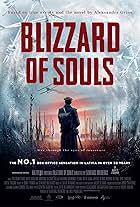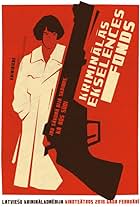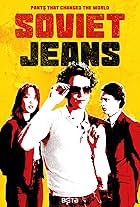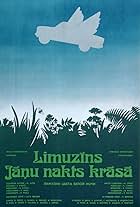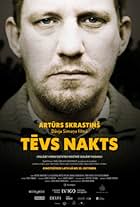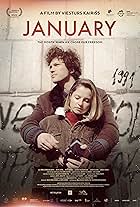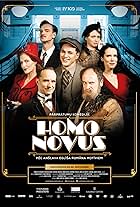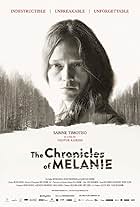AVALIAÇÃO DA IMDb
7,0/10
627
SUA AVALIAÇÃO
Ansis é um pintor de letreiros e, embora a Europa esteja passando por grandes mudanças, sua arte é necessária em todos os regimes: a república um tanto autoritária, depois o que parece ser o... Ler tudoAnsis é um pintor de letreiros e, embora a Europa esteja passando por grandes mudanças, sua arte é necessária em todos os regimes: a república um tanto autoritária, depois o que parece ser o comunismo e, por fim, o nazismo.Ansis é um pintor de letreiros e, embora a Europa esteja passando por grandes mudanças, sua arte é necessária em todos os regimes: a república um tanto autoritária, depois o que parece ser o comunismo e, por fim, o nazismo.
- Direção
- Roteiristas
- Artistas
- Prêmios
- 5 vitórias e 12 indicações no total
Agnese Budovska
- Naiga
- (as Agnese Cirule)
Vladislav Vasiliev
- Soldier
- (não creditado)
Avaliações em destaque
"Pilseta pie upes" is a masterpiece of contemporary Latvian cinema. This film provides a poignant narrative about a challenging period in Latvia's history. Set in a remote Latgalian town, it navigates through the profound trials faced by the inhabitants: the Holocaust, the horrors of communism, and the nightmare of fascism, which crash upon the lives of ordinary people like relentless waves. The central character, a simple yet deeply soulful young man, symbolizes the Latvian people caught in the grinding gears of war. His journey is not just a personal odyssey but a reflection of the collective experience of a nation under siege. The film's ability to portray such intense historical and emotional landscapes with authenticity and sensitivity makes it an exceptional work in Latvian filmography.
With its powerful storytelling, compelling performances, and hauntingly beautiful cinematography, "Pilseta pie upes" stands as a testament to the resilience of the human spirit in the face of unimaginable adversity. This film is not just a historical recount; it is a deeply human story that resonates on many levels, making it an essential watch for anyone interested in the rich and turbulent history of Latvia.
With its powerful storytelling, compelling performances, and hauntingly beautiful cinematography, "Pilseta pie upes" stands as a testament to the resilience of the human spirit in the face of unimaginable adversity. This film is not just a historical recount; it is a deeply human story that resonates on many levels, making it an essential watch for anyone interested in the rich and turbulent history of Latvia.
I'm Latvian, and I'm patriot, and I've even spent a lot of my childhood in the locations near our Eastern Russian border, where this movie's plot was happening and where it was shot, so I had reasonably high expectations for this movie. Also in the last few years our local movie studios have started to make a really decent movies, especially historic ones, so I did expect that this one will keep rising the standards of our local moviemaking. Boy, I was wrong.
Unfortunatly this movie left a lot to be desired - plot was trying to be a romantic drama (and comedy) set on the top of politic/social/war stage, cinematography tried to follow the latest modern trends, and cast of mostly unknown actors was trying to give a fresh feel to this flick, but unfortunatly it failed in all three areas...
Plot was boring, badly paced and intended bits of non-linear storytelling made some bits even straight confusing, and I imagine it would be even worse for the people who have not read the source novel first. Cinematography was poor. Artistic choice of making every...single...shot to have an angled horizon was just painful to watch - instead of serving as a nice touch and bringing some fresh framing to the scenes, it left me wondering whether the film crew simply had a problem with a camera dolly leveling... And acting was far from what I expected after reading news articles about "cast of young, fresh talents" - there was absolutely no chemistry between any of the main characters in the love triangle, or between anyone else, for that matter. The dull expressions and awkward clumsiness of the lead actor was not so much portrail of his character, as it was simply a bad acting. Asking actors to speak in three languages, most of which were not their native, didn't help at all.
In conclusion - maybe if this movie would've been conceived, shot and launched in theaters a few years earlier, before the numerous other latest Latvian historic dramas, it would be a somewhat decent movie by itself, but given the good Latvian movies shot lately, this was a really dissapointing in comparison. 5 out of 10 stars from me.
Unfortunatly this movie left a lot to be desired - plot was trying to be a romantic drama (and comedy) set on the top of politic/social/war stage, cinematography tried to follow the latest modern trends, and cast of mostly unknown actors was trying to give a fresh feel to this flick, but unfortunatly it failed in all three areas...
Plot was boring, badly paced and intended bits of non-linear storytelling made some bits even straight confusing, and I imagine it would be even worse for the people who have not read the source novel first. Cinematography was poor. Artistic choice of making every...single...shot to have an angled horizon was just painful to watch - instead of serving as a nice touch and bringing some fresh framing to the scenes, it left me wondering whether the film crew simply had a problem with a camera dolly leveling... And acting was far from what I expected after reading news articles about "cast of young, fresh talents" - there was absolutely no chemistry between any of the main characters in the love triangle, or between anyone else, for that matter. The dull expressions and awkward clumsiness of the lead actor was not so much portrail of his character, as it was simply a bad acting. Asking actors to speak in three languages, most of which were not their native, didn't help at all.
In conclusion - maybe if this movie would've been conceived, shot and launched in theaters a few years earlier, before the numerous other latest Latvian historic dramas, it would be a somewhat decent movie by itself, but given the good Latvian movies shot lately, this was a really dissapointing in comparison. 5 out of 10 stars from me.
Latgale or Latgalia is the landlocked easternmost region of Latvia north of the Daugava river. It has a mostly Catholic or Eastern Orthodox population, in contrast with the rest of Latvia, predominantly Protestant. Latgalia also had a large Jewish minority before WWII; most of them perished in the Holocaust or emigrated. Latgalia has its own language, one of the historic forms of Latvian. This is the language of this film. Scenario: a town on the Daugava river. Subject: the life and loves of Ansis, a young budding local artist who makes a living as a sign painter. He is Everyman, a survivor, carried by the tide of his country's fortunes while trying not to lose his good nature.
Originally a part of the Russian Empire, Latvia became independent in 1920 during the Russian Civil War. In 1934 a nationalistic dictatorship took power, and the movie begins in this period. Ansis' love interest is Zisele, daughter of a local Jewish shopowner, a courtship strongly discouraged by her father and the local priest. Zisele is a convinced Communist; we see her reading one of Alexandra Kollontai's books (Kollontai was a champion of Marxist feminism). Zisele supports the Soviet occupation in 1940 but is put off by its oppressive nature. Ansis' new love interest is Naiga, a Latvian girl. He feels an obligation to Zisele, and in fact saves her life during the Nazi occupation. The movie ends at the closing of the war, with the Germans defeated and in flight, a new Soviet occupation looming and many Latvians trying to get away as far as possible from the madness of Europe. All through the movie a small boat plying the Daugava reflects the changes; we see it first loaded with right wing paramilitaries, then Soviet soldiers, then Nazi soldiers and finally desperate fugitives.
I liked this movie with some reservations. The action is at times too slow. I was somewhat put off by the oblique, off kilter shots. This device works in edgy urban scenes (The Third Man) but is not suited to a placid rural setting. There is not much feeling or chemistry in either of Ansis' relationships. On the positive side, acting is first rate (many of the actors are nonprofessional) and cinematography does justice to the melancholic landscapes of Northern Europe. As a bonus, you get to listen to Latvian folk songs, both plaintive ditties and spirited, joyful dance music.
Originally a part of the Russian Empire, Latvia became independent in 1920 during the Russian Civil War. In 1934 a nationalistic dictatorship took power, and the movie begins in this period. Ansis' love interest is Zisele, daughter of a local Jewish shopowner, a courtship strongly discouraged by her father and the local priest. Zisele is a convinced Communist; we see her reading one of Alexandra Kollontai's books (Kollontai was a champion of Marxist feminism). Zisele supports the Soviet occupation in 1940 but is put off by its oppressive nature. Ansis' new love interest is Naiga, a Latvian girl. He feels an obligation to Zisele, and in fact saves her life during the Nazi occupation. The movie ends at the closing of the war, with the Germans defeated and in flight, a new Soviet occupation looming and many Latvians trying to get away as far as possible from the madness of Europe. All through the movie a small boat plying the Daugava reflects the changes; we see it first loaded with right wing paramilitaries, then Soviet soldiers, then Nazi soldiers and finally desperate fugitives.
I liked this movie with some reservations. The action is at times too slow. I was somewhat put off by the oblique, off kilter shots. This device works in edgy urban scenes (The Third Man) but is not suited to a placid rural setting. There is not much feeling or chemistry in either of Ansis' relationships. On the positive side, acting is first rate (many of the actors are nonprofessional) and cinematography does justice to the melancholic landscapes of Northern Europe. As a bonus, you get to listen to Latvian folk songs, both plaintive ditties and spirited, joyful dance music.
Principais escolhas
Faça login para avaliar e ver a lista de recomendações personalizadas
- How long is City on the River?Fornecido pela Alexa
Detalhes
- Data de lançamento
- Países de origem
- Centrais de atendimento oficiais
- Idiomas
- Também conhecido como
- City on the River
- Locações de filme
- Empresa de produção
- Consulte mais créditos da empresa na IMDbPro
Bilheteria
- Faturamento bruto mundial
- US$ 988
- Tempo de duração1 hora 52 minutos
- Cor
Contribua para esta página
Sugerir uma alteração ou adicionar conteúdo ausente

Principal brecha
By what name was O Pintor de Sonhos (2020) officially released in Canada in English?
Responda











